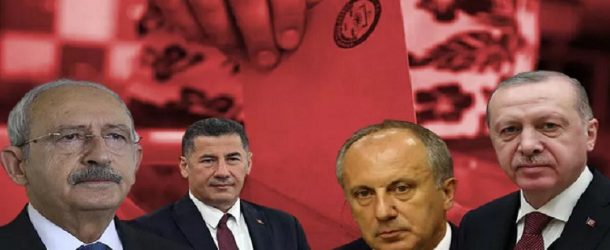Introduction
In Türkiye (Turkey), presidential and parliamentary elections are scheduled for May 14, 2023. So, this means only 46 days left for the country to choose its new President and form a new parliament. However, due to the electoral system, in case none of presidential candidates gets more than half of the votes in the first round, there will be a second round two weeks after, on May 28, 2023.
In this article, I am going to first present presidential candidates and their blocs in Türkiye, later analyze recent opinion polls about the elections, and lastly focus on some crucial factors which might affect the results of the presidential and parliamentary elections.
Four Candidates Set for Presidency
Now it is official and only four presidential candidates will contend on May 14, 2023, for becoming Turkish President. Let us focus on these candidates, their backers, and their ideological preferences.
The joint candidate of the People Alliance’s (Cumhur İttifakı) is Türkiye’s 12th and current President (2014-) Recep Tayyip Erdoğan. This bloc is consisted of Islamist/conservative AK Parti (Justice and Development Party), Turkish nationalist/far-right MHP (Nationalist Action Party) whose chair is veteran politician Devlet Bahçeli, and Turkish nationalist/far-right/Islamist BBP (Great Unity Party) whose leader is Mustafa Destici. However, after witnessing the rise of the opposition by bringing together different political parties and actors, President Erdoğan also adopted the same strategy and added two new political parties to his bloc very recently. These two new political parties are New Welfare Party (Yeniden Refah Partisi/YRP) and Free Cause Party (Hür Dava Partisi/Hüda Par).
The New Welfare was established by Türkiye’s former Islamist Prime Minister Necmettin Erbakan’s son Fatih Erbakan in late 2018. The party represents a classical version of Turkish political Islam with anti-Occidentalist (anti-Western) ideas and connotations and puts forward a more radical Islamist agenda compared to AK Parti. The party adopts a hardliner positioning especially about women rights, adultery, Cyprus Dispute, and relations with the United States (U.S.) and the European Union (EU). However, due to the passiveness of the other pro-Erbakan National View/National Outlook (Milli Görüş) political organization Felicity Party (Saadet Partisi/SP), this party is on the rise recently. Albeit founded recently, the party has approximately 270,000 members and according to recent polls 1-3 percent potential votes. In fact, the party founder and leader Fatih Erbakan was running for presidency independently and already collected 70,000 signatures, but later upon the proposal of Erdoğan, he decided to join the People’s Alliance and withdrew from the presidential race on behalf of Erdoğan. The New Welfare Party will surely bring new votes to AK Parti and Erdoğan, but their misogynist rhetoric and appeals could disturb female voters and lead to loss of some votes as well.
The Free Cause Party (Hüda Par) on the other hand was established in late 2012 by former members and supporters of Kurdish Hezbollah (also known as Sofik), a very radical Islamist (Sunni) and Kurdish terrorist organization who conducted serious crimes against the state (such as the killing of former police captain Gaffar Okan) and against more liberal Islamist figures (such as Gonca Kuriş) in the past. The party openly advocates a federal state system and cultural rights for Kurds. The party’s leader is Zekeriya Yapıcıoğlu, a former Hezbollah militant. Hüda Par does not possess a very high vote potential, but their challenge to PKK and HDP (Peoples’ Democratic Party) is an asset for Erdoğan and the Turkish State to resist against the secular leftist appeals of these groups (PKK/HDP).
The joint candidate of the People’s Alliance, President Recep Tayyip Erdoğan (1954-) has been ruling Türkiye since 2003; first as Prime Minister (2003-2014), later as President of the Republic in the parliamentary system (2014-2018), and lastly as Türkiye’s President (2018-) within a system of Turkish type of presidentialism. Erdoğan became an influential political figure in 1994 as being shockingly elected Istanbul Mayor from Necmettin Erbakan’s Welfare Party (Refah Partisi/RP) against the secular establishment. Coming from a traditional Sunni Turkish family from Rize, Erdoğan was raised in Istanbul’s Kasımpaşa neighborhood and attended to an İmam Hatip School. Erdoğan was graduated from Marmara University’s Faculty of Economics and Administrative Sciences, but some critics claim that his university diploma is fake. Coming from an Islamist background, Erdoğan has always been a controversial figure in the secular establishment. However, his charisma and strong bonds with the Islamist masses made him an undisputed and undefeated leader. In fact, since 2002, Erdoğan never lost an election himself, but his party’s defeat at 2019 local elections in Istanbul and Ankara is considered as his only loss. Moreover, this time Erdoğan’s job is tougher because recent polls show that he could get around maximum 44-45 percent of the votes in the first round of the presidential elections.
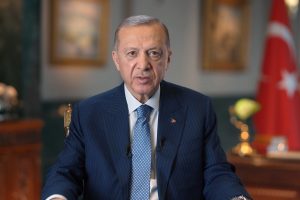
Recep Tayyip Erdoğan
The joint candidate of the Nation Alliance (Millet İttifakı) is Kemal Kılıçdaroğlu. Born in 1948 in Tunceli (formerly known as Dersim), Kılıçdaroğlu comes from an Alevi-Zaza family. He was educated in Economics at the Ankara Academy of Economics and Commercial Sciences (now Gazi University), from which he graduated in 1971. Having worked long years in important state institutions including the Social Insurance Institution (SSK), Kılıçdaroğlu has been a member of the parliament from pro-secular CHP (Republican People’s Party) since 2002. After making a rapid rise in petty politics with his anti-corruption campaigns and clean record, he was elected pro-secular CHP’s new chair in 2010 with great support from media and party members, following a sex scandal that forced former chair Deniz Baykal to resignation. He also served as the Vice President of the Socialist International between 2012 and 2014.
Kemal Kılıçdaroğlu represents the classical secular/Kemalist heritage of the Turkish State, but he was able to bring new votes and supporter groups to his party by following a new strategy. So, starting from 2017, beginning with his famous Justice March (Adalet Yürüyüşü), he was able to convince new right-wing groups to support his leadership against Erdoğan’s authoritarian-leaning rule. Accordingly, -separated from MHP- Meral Akşener’s Good Party (İYİ Parti) and two other right-wing parties; Gültekin Uysal’s center-right Democrat Party (DP) and Temel Karamollaoğlu’s Islamist Felicity Party (Saadet Partisi/SP) began to support him. More recently, two new parties founded by former AK Parti cadres; Ali Babacan’s DEVA (Democracy and Leap Party) and Ahmet Davutoğlu’s Future Party (Gelecek Partisi) also began to endorse him and joined the Nation Alliance now called as the “sextet chair” (altılı masa). Another recent success of Kemal Kılıçdaroğlu was to convince pro-Kurdish HDP not to contend in this presidential election with their own candidate. In that sense, Kılıçdaroğlu secured 11-13 percent additional votes from secular Kurdish groups and Turkish far-left before this election.
Kılıçdaroğlu followed a very clever strategy to secure his presidential candidacy as well. He forced all political parties within his bloc to focus first on the Nation Alliance’s programme rather than the presidential candidate and slowly began to convince all political parties by making his candidacy the only viable option in time. So, by underlining the strength of AK Parti in municipal councils, he convinced many people that Ankara Mayor Mansur Yavaş or İstanbul Mayor Ekrem İmamoğlu should not be presidential candidates. In the end, when his candidacy became a political reality, he also managed a good leadership skill to convince İYİ Parti leader Meral Akşener after a short-term political crisis. Akşener was normally endorsing İmamoğlu and/or Yavaş for presidency, but upon social pressures, he gave green light to Kılıçdaroğlu’s candidacy.
Kılıçdaroğlu is the leader of CHP, the oldest political party in the country. CHP was closed by the military regime following the 1980 military coup but was reestablished by Deniz Baykal and İsmail Cem in 1992. That is why, Kılıçdaroğlu is not a lonely man and he represents a very strong political tradition in Türkiye. Although established as a modernist, Kemalist, statist, and Turkish nationalist political party a century ago, the new CHP is much more a European-type social democratic/socialist party, trying to catch everyone and become a centered political actor. I think Kılıçdaroğlu has a great chance in winning the presidential election in the first round. If we make a simple calculation according to previous opinion polls, Kılıçdaroğlu’s chance will be better understood by everyone: CHP (25 percent) + İYİ Parti (13 percent) + Other components of Nation Alliance (3 percent) + HDP (11 percent): 52 percent.
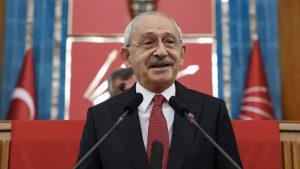
Kemal Kılıçdaroğlu
The only potential problem for Kılıçdaroğlu and the Nation Alliance seems to be the situation of Muharrem İnce. Born in 1964 in Yalova, İnce had been a CHP partisan since his youth. He eventually became a member of the parliament from CHP in 2002 and served within the Turkish Grand National Assembly until 2018. He was a very influential and popular figure with his brilliant speeches in media and in the parliament and served as CHP’s parliamentary deputy group leader between 2010 and 2014. He was also chosen the presidential candidate of his party in 2018, but lost the election to Erdoğan. After this defeat, he was heavily criticized and disfavored by CHP circles. He tried to challenge Kılıçdaroğlu to become the new leader of CHP but failed two times. Resigned from CHP, he established the Homeland Party (Memleket Partisi) in 2021 to take his chance in politics independently from his former party. İnce represents a more nationalist and classical Kemalist version of CHP and he criticizes Kılıçdaroğlu especially based on his moderate approach towards HDP and pro-Kurdish groups having links with the PKK. İnce’s party is very weak in organization and the only figure known from his party is Professor İpek Özkal Sayan from Ankara University. However, İnce is an excellent orator and he has considerable popularity and support among young and apolitical voters due to his word games, jokes, and effective use of social media. In that sense, in case İnce could reach 7-8 percent votes in the first round of the presidential election by convincing many voters among the classical CHP and İYİ Parti supporters, he could create a chance for Erdoğan to beat Kılıçdaroğlu in the second round.
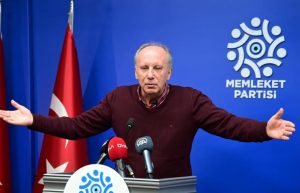
Muharrem İnce
The fourth and the last presidential candidate is Sinan Oğan. Born in 1967 in Iğdır, Oğan is a classical Turkish nationalist politician. He coordinates a Turkish think-tank called TÜRKSAM for many years. Graduated from the department of Management at Marmara University in 1989, Oğan obtained a PhD in International Relations and Political Science from the Moscow State Institute of International Relations in 2009. He has close links with Azerbaijan and the Azeri political elite. He was a MHP deputy within the Turkish parliament between 2011 and 2015, but later resigned from his party due to disagreements with the party leader Devlet Bahçeli. Oğan is endorsed by Ancestral Alliance (ATA İttifakı), a new political bloc composed of four right-wing nationalist parties: Professor Ümit Özdağ’s Victory Party (Zafer Partisi), Justice Party (Adalet Partisi), My Country Party (Ülkem Partisi), and Turkey Alliance Party (Türkiye İttifakı Partisi). Among these, the only noticeable party in the opinion polls is Özdağ’s Victory Party. With its ultranationalist and anti-immigrant rhetoric, the party became visible and popular recently among the far-right voters.
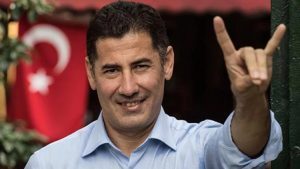 Sinan Oğan
Sinan Oğan
Recent Opinion Polls
If we analyze the recent opinion polls for the presidential race, we see that Nation Alliance candidate and CHP leader Kemal Kılıçdaroğlu leads all polls. However, the results are very different; whereas some polls suggest that Kılıçdaroğlu could be easily elected in the first round of the election with 51-53 percent of the votes, some others claim that he could not take more than 45-46 percent in the first round. In my opinion, unless Muharrem İnce makes a big progress, Kılıçdaroğlu will win the presidential election in the first round. However, in case the election goes to the second round, of course Erdoğan could still have a chance to win slightly by creating a political polarization based on Kılıçdaroğlu’s Alevi and Kurdish (Zaza) identity.
If we look at Erdoğan’s support in the presidential race on the other hand, we see that it changes between 40 and 47 percent, but none of the polls suggest that Erdoğan could win the election in the first round anymore. Among the other candidates, Muharrem İnce seems more pretentious as some polls already suggest that he could get around 7 percent of the total votes in the first round. However, many other polls show İnce somewhere between 3 and 5 percent, which might not be enough to secure a second round. Lastly, Sinan Oğan has 1 to 3 percent potential mostly with the votes coming from anti-immigrant Zafer Partisi.
If we look at the recent opinion polls about parliamentary elections, we still see that AK Parti is the leading party of the country despite of all problems. AK Parti’s vote ranges from 31 to 37 percent, but most of the people are sure that AK Parti could still become the largest bloc within the parliament. CHP’s votes on the other hand are pointed as somewhere between 25 and 28 percent. Of course, many things could change in 46 days and CHP could still make a progress during the presidential campaign. For instance, the effect of the terrible earthquakes in Türkiye in February 2023 diminished AK Parti’s votes and had a positive effect on the opposition. İYİ Parti is expected to get 10 to 13 percent of the votes in the parliamentary elections. Recent polls show that pro-Kurdish HDP could get 10 to 12 percent of the votes. MHP on the other hand is shown somewhere between 5 to 7 percent. Muharrem İnce’s Memleket Partisi’s presence is also felt in parliamentary election polls, as his party is expected to take 3 to 6 percent of the total votes for the moment. Ali Babacan’s DEVA party is important as well since the party could get 1 to 3 percent of the votes according to recent polls. Lastly, the New Welfare Party could get 1 to 2 percent of the total votes in a parliamentary election.
Factors That Might Change the Results
First of all, especially in terms of presidential election, the most important parameter would be the performance of Muharrem İnce. We already know that İnce is an excellent speaker who could agitate masses. So, if he would be able to increase his votes considerably by organizing large demonstrations and appearing in tv channels more frequently, by getting high votes in the first round, he could secure the second round and thus, could create another chance for Erdoğan. However, it is also possible that İnce and Kılıçdaroğlu could get into contact and make an agreement for the second round. Kılıçdaroğlu could try to convince him by offering him a position in the new cabinet as well. So, it seems to me like the “İnce affair” will be important for the outcome of the presidential election.
Secondly, since Turkish political parties take help from public relations (pr) experts in recent years, the success of the electoral campaigns could change the preferences of the voters. Until now, AK Parti has been very successful in organizing such campaigns in the Turkish context. However, recently, CHP has also began to use more modern techniques and increase its popularity by modern social science methods. In that sense, we will be able to see soon two mega political campaigns organized by AK Parti and CHP, which would be influential in directing in the indecisive and apolitical voters.
Thirdly, there is an unspoken important dimension of the elections. If the presidential election goes to the second round, the composition of the parliament could direct voters to vote for Erdoğan or Kılıçdaroğlu. In other words, in case AK Parti or CHP gets more seats in the parliament on May 14, 2023, but the presidential election goes to second round, votes at the center might be headed to the leader of the majority bloc. Since almost all polls show AK Parti ahead in the parliamentary elections, I think it might be a wise decision for Kılıçdaroğlu to convince Muharrem İnce to withdraw from the presidential race and endorse him. Because otherwise, in a scenario based on AK Parti majority in the parliament after 14 May, Kılıçdaroğlu’s whole “return to parliamentary system” rhetoric could be nonsense and it might direct voters at the center to give one last chance to Erdoğan.
Conclusion
To conclude, Türkiye’s 2023 presidential and parliamentary elections will be very interesting for international observers. Personally, I would prefer a democratic country having good relations both with the West and the East and I am hopeful about Turkish people’s ability to make a good choice. In that sense, I am sure that the elections will take place in a secure and democratic environment and Türkiye will return to normalcy following the elections.
Assoc. Prof. Ozan ÖRMECİ


